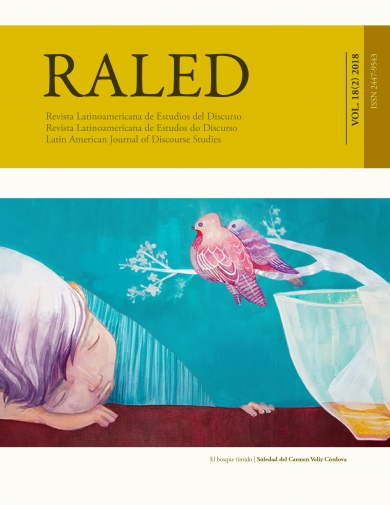Topoi as an argumentative resource in comments from political blogs in Chilean online newspapers
DOI:
https://doi.org/10.35956/v.18.n2.2018.p.59-76Keywords:
topoi. online political discourse. comments. blogs.Abstract
This paper aims to study the comments in blogs of online newspapers, as a specific discourse genre, towards characterizing the form and identify the role topoi have in the opinion columns in online newspapers, from a qualitative paradigm. Topoi are commonplaces in the argument that are apparently unquestionable on confrontation (Anscrombe and Ducrot 1983; Wodak 2003; Van Dijk 2005). Through qualitative methods, 1076 comments on blogs four Chilean online newspapers (EMOL, The Clinic, El Mostrador and Cambio 21) were analyzed, in order to identify the use and function of topoi in various argumentative strategies used by speakers/writers of this type of media. It was established that, in the speeches analyzed, topoi are presented in the argument as fixed formulas that allow commentators construct their meanings in their cyber-arguments. From the analysis, it was found that most of the topoi used in these media commentators are drawn from the popular phrasing and appeal to shared knowledge.
Downloads
References
Anscombre, J.C. y Ducrot, O. 1983. La argumentación en la lengua. Madrid: Gredos.
Arancibia, M. y Montecino, L. 2013. El blog de comentarios a textos de opinión en ciberperiódicos: un género en constante reconstrucción. Literatura y lingüística 28: 123-147.
Atria, F., Benavente, J., Couso, J., Joignant, A. y Larraín, G. 2012. El otro modelo. Del orden neoliberal al régimen de lo público. Santiago: Debate.
Bajtin, M. 2002 [1979]. Estética de la creación verbal. Buenos Aires: Siglo XXI.Blood, R. 2002. The Weblog Handbook. Cambridge: Basic Books.
Fairclough, I. y Fairclough, N. 2012. Political Discourse Analysis. London: Routdlege.
Foucault, M. 1970. El orden del discurso. Barcelona: Tusquest.
Khosravinik, M. y Unger, J. W. 2015. Critical discourse studies and social media: Power, re-sistance and critique in changing media ecologies. En R. Wodak y M. Meyer (Eds.). Methods of critical discourse studies, pp. 205-233. London: Sage.
Mayol, A. 2012. El derrumbe del modelo. Santiago: LOM Ediciones.
Montecino, L., y Arancibia, M. 2016. Recursos de valoración en comentarios de blogs de ciberperiódicos chilenos: representaciones discursivas sobre crecimiento, desigualdad y justicia social. Boletín de Filología 50, 2: 77-101.
Myers, G. 2010. Discourse of Blogs and Wikis. London: Continuum.
Reisigl, M. 2014. Argumentation Analysis and the Discourse-Historical Approach: A Methodolo-gical Framework. En C. Hart y P. Cap. (Eds.). Contemporary Critical Discourse Studies, pp. 67-96. London, England: Bloomsbury.
Reisigl, M. y Wodak, R. 2015. The discourse-historical approach (DHA). En R. Wodak y M. Meyer (Eds.). Methods of critical discourse studies, pp. 23- 61. London: Sage.
Ritzer, G. y Jurgenson, N. 2010. Production, consumption, prosmption: The nature of capita-lism in the age of the digital ‘prosumer’. Journal of Consumer Culture 10, 1: 13-36.
Van Dijk, T. 2005. Politics, ideology and discourse. En R. Wodak. Elsevier Encyclopedia of Langua-ge and Linguistics. Volume on Politics and Language, pp. 728-740. Amsterdam: Elsevier.
Wodak, R. 2003. De qué trata el análisis crítico del discurso (ACD). Resumen de su historia, sus conceptos fundamentales y sus desarrollos. En R. Wodak y M. Meyer. Métodos de análisis crítico del discurso, pp. 17- 34. Barcelona: Gedisa.
Wodak, R. 2009. The discourse of politics in action: Politics as usual. Basingstoke: Palgrave Macmillan.
Yus, F. 2010. Ciberpragmática 2.0: nuevos usos del lenguaje en Internet. Barcelona: Planeta.
Zappavigna, M. 2012. Discourse of Twitter and Social Media: How we use Language to Create Affiliation on the Web. London: Continuum.
Downloads
Published
How to Cite
Issue
Section
License

This work is licensed under a Creative Commons Attribution-NonCommercial-NoDerivatives 4.0 International License.
The authors retain the copyright and guarantee RALED the right to be the first publication of the work as well as a Creative Commons Attribution License that allows others to share the work with recognition of authorship and the initial publication in this journal.




